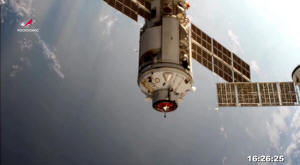International Space Station thrown out of control by misfire of Russian
module -NASA
 Send a link to a friend
Send a link to a friend
 [July 30, 2021]
By Steve Gorman and Polina Ivanova [July 30, 2021]
By Steve Gorman and Polina Ivanova
(Reuters) -The International Space Station
(ISS) was thrown briefly out of control on Thursday when jet thrusters
of a newly arrived Russian research module inadvertently fired a few
hours after it was docked to the orbiting outpost, NASA officials said.
The seven crew members aboard - two Russian cosmonauts, three NASA
astronauts, a Japanese astronaut and a European space agency astronaut
from France - were never in any immediate danger, according to NASA and
Russian state-owned news agency RIA.
But the malfunction prompted NASA to postpone until at least Aug. 3 its
planned launch of Boeing's new CST-100 Starliner capsule on a highly
anticipated uncrewed test flight to the space station. The Starliner had
been set to blast off atop an Atlas V rocket on Friday from the Kennedy
Space Center in Florida.

Thursday's mishap began about three hours after the multipurpose Nauka
module had latched onto the space station, as mission controllers in
Moscow were performing some post-docking "reconfiguration" procedures,
according to NASA.
The module's jets inexplicably restarted, causing the entire station to
pitch out of its normal flight position some 250 miles above the Earth,
leading the mission's flight director to declare a "spacecraft
emergency," U.S. space agency officials said.
An unexpected drift in the station's orientation was first detected by
automated ground sensors, followed 15 minutes later by a "loss of
attitude control" that lasted a little over 45 minutes, according to
Joel Montalbano, manager of NASA's space station program.
'TUG-OF-WAR'
Flight teams on the ground managed to restore the space station's
orientation by activating thrusters on another module of the orbiting
platform, NASA officials said.
In its broadcast coverage of the incident, RIA cited NASA specialists at
the Johnson Space Center in Houston, Texas, as describing the struggle
to regain control of the space station as a "tug of war" between the two
modules.

At the height of the incident, the station was pitching out of alignment
at the rate of about a half a degree per second, Montalbano said during
a NASA conference call with reporters.
The Nauka engines were ultimately switched off, the space station was
stabilized and its orientation was restored to where it had begun, NASA
said.
Communication with the crew was lost for several minutes twice during
the disruption, but "there was no immediate danger at any time to the
crew," Montalbano said. He said "the crew really didn't feel any
movement."
[to top of second column]
|

The Nauka (Science) Multipurpose Laboratory Module is seen during
its docking to the International Space Station (ISS) on July 29,
2021 in this still image taken from video. Roscosmos/Handout via
REUTERS

Had the situation become so dangerous as to require
evacuation of personnel, the crew could have escaped in a SpaceX
crew capsule still parked at the outpost and designed to serve as a
"lifeboat" if necessary, said Steve Stich, manager of NASA's
commercial crew program.
What caused the malfunction of the thrusters on the
Nauka module, delivered by the Russian space agency Roscosmos, has
yet to be determined, NASA officials said.
Montalbano said there was no immediate sign of any damage to the
space station. The flight correction maneuvers used up more
propellant reserves than desired, "but nothing I would worry about,"
he said.
After its launch last week from Kazakhstan's Baikonur Cosmodrome,
the module experienced a series of glitches that raised concern
about whether the docking procedure would go smoothly.
Roscosmos attributed Thursday's post-docking issue to Nauka's
engines having to work with residual fuel in the craft, TASS news
agency reported.
"The process of transferring the Nauka module from flight mode to
'docked with ISS' mode is underway. Work is being carried out on the
remaining fuel in the module," Roscosmos was cited by TASS as
saying.

The Nauka module is designed to serve as a research lab, storage
unit and airlock that will upgrade Russia's capabilities aboard the
ISS.
A live broadcast showed the module, named after the Russian word for
"science," docking with the space station a few minutes later than
scheduled.
"According to telemetry data and reports from the ISS crew, the
onboard systems of the station and the Nauka module are operating
normally," Roscosmos said in a statement.
"There is contact!!!" Dmitry Rogozin, the head of Roscosmos, wrote
on Twitter moments after the docking.
(Reporting and writing by Steve Gorman in Los Angeles and Polina
Ivanova in MoscowEditing by Mark Heinrich, Leslie Adler and Raju
Gopalakrishnan)
[© 2021 Thomson Reuters. All rights
reserved.] Copyright 2021 Reuters. All rights reserved. This material may not be published,
broadcast, rewritten or redistributed.
Thompson Reuters is solely responsible for this content.
 |